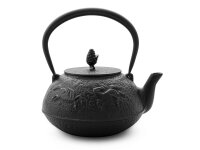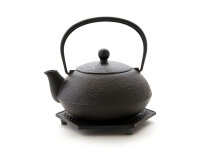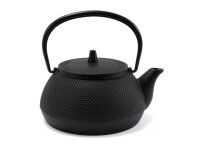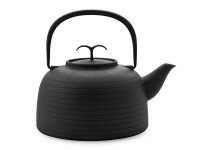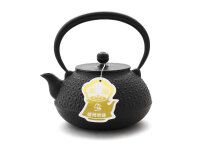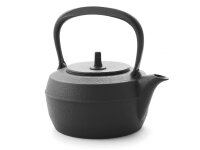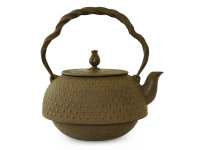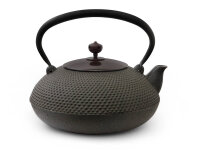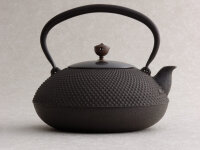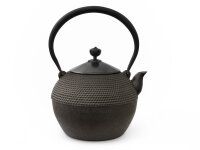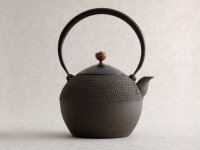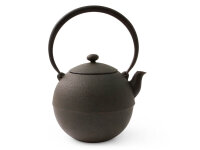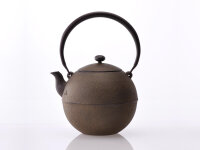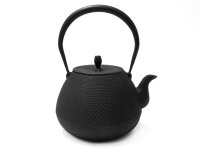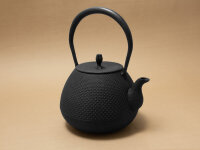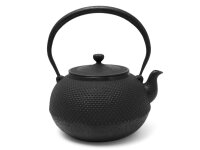
Japanese Tetsubin
A Tetsubin is a Cast Iron Water Kettle
Traditionally, in Japan, only water kettles, also known as teapots, were made from cast iron. These Tetsubin are solely intended for boiling water, primarily for tea preparation, and keeping it warm so that the second and third infusions have the right temperature for delicious Matcha or green tea. For tea preparation, Kyusu teapots are used, mostly made of ceramic, porcelain, preferably high-quality clay. It was only in the course of development and internationalization that cast iron teapots were also produced. However, the role of the Tetsubin is not limited to just heating water. It has long been recognized that water kettles made from high-quality iron ore or iron sand, crafted in elaborate handwork, significantly enhance the taste quality of the water. The high-quality iron dissolves in the water during boiling, making daily green tea, already an important source of iron and other valuable substances, a significant supplier of iron.
- Tetsubin: Cast iron water kettle, significant role in the tea ceremony
- Kyusu: Teapot (tea pot) made of cast iron, porcelain, or clay
- Enhancement of taste in water and green tea
- Nanbu-Tetsubin: Highest quality, handmade
Highest Quality, Elaborate Handwork
Iwachu is the market leader for elaborately crafted handmade Tetsubin and Kyusu cast iron teapots. The significant role that Tetsubin plays in the tea ceremony clearly indicates the high-quality standards that Japanese tea masters have for this "tool" as well. These standards relate to aesthetics, the purity of raw materials, and, of course, the quality of craftsmanship and durability. Only a few artisanal workshops can meet these demands because the production process is extremely complex, and the desired results can only be achieved with years of experience.
As raw materials, only high-quality, pollutant-tested iron ore or iron sand in a very pure form are used. The higher graphite content in this higher-quality iron is one of the reasons why cast iron products from Japan have better heat conductivity and very high dimensional stability.
The casting molds needed to make these beautiful, often traditional water kettles are handmade. For each handmade Tetsubin, five molds are required: one for the exterior and interior each, two molds for the spout, and one mold for the lid. These molds for high-quality Nanbu-Tetsubin are crafted by artisans from a mixture of clay and sand. Often, the molds need repair after each casting, and rarely can they be used for more than 5 casts. The sand and clay come from the local area, and the shaping is done on rotating tables, similar to potter's wheels.
Even after casting, there is still a lot of handwork, especially in creating beautiful patterns like the Arare pattern. The manufacturing process is very elaborate and involves over 60 steps. To carry out these steps carefully and achieve the desired result, a master artisan with years of experience and training is required. It takes at least 15 years to become a master. A special process of "baking" in a charcoal fire activates the cast iron and develops a natural rust protection. However, we want to emphasize that Tetsubin are not "rust-free" according to European standards. Please be sure to follow the usage and care instructions to enjoy your Tetsubin for a lifetime.
- Products of high quality and clear origin from Japan can last a lifetime
- Pay close attention to the origin
- Iwachu and other quality manufacturers produce the highest quality by hand
- Raw materials should be pure, clean iron ore or iron sand
- Nanbu-Tetsubin with elaborate craftsmanship offer dimensional stability and high heat conductivity
- Brand products from Japan are produced by experienced masters
Acquire an Original and Enjoy It for a Lifetime
Iwachu marks its products with the company stamp. Unfortunately, as in other product categories, there is a wide range of products that may appear similar at first glance. It is not always easy for an inexperienced observer to discern aesthetic differences. However, it is even more challenging when purchasing to definitively determine the manufacturing processes, quality, and safety of raw materials. Experts may recognize the simple, inexpensive gray cast iron of cheap products, but many other quality criteria may only become apparent through taste after use or much later. Iwachu's products undergo rigorous testing in Japan - Iwate Prefecture, Southern Iron Union cooperative - according to food hygiene laws, and we have found no indications of complaints worldwide. Another indicator of handmade products is often two spots on the bottom where the Tetsubin was attached for casting. These can be recognized by a slightly different surface, as they were closed later.
- Originals from Iwachu are marked with the company stamp
- Brand products promise a very long service life, often a lifetime
- Originals from Japan undergo rigorous testing
Sealing and Surface Protection of Cast Iron Tetsubin
Cast iron is inherently porous, which can lead to minor leaks in Tetsubin after casting in some areas. This is unavoidable due to the nature of the material. Therefore, density testing and, if necessary, sealing are important steps that must be carefully carried out. However, it is not only the process itself that is crucial, but also how and with what material the sealing is done, as it affects the longevity and user's health. Nanbu-Tetsubin, which includes all Tetsubin from Japanese manufacturers made by hand, are sealed with natural substances. The artisans use Urushi for this purpose. Urushi is obtained from the tree of the same name and is a pure natural lacquer that hardens under heat and has an extremely long lifespan. The oldest Urushi products displayed in Japanese museums were made over 3,500 years ago. Tetsubin from Iwachu and similar manufacturers are often treated on the outside with Urushi and often an additional layer of natural materials like Urushi, iron sand, and green tea. This protective coating is hardened at about 400°C and lasts a lifetime. Ohaguro coating is also used - for example, by Iwachu - consisting of green tea, iron sand, and vinegar.
- Sealing with natural Urushi lacquer
- Very long lifespan
- Outer protection with Ohaguro or Urushi / Green tea / Iron sand
- Purely natural materials in Nanbu-Tetsubin
Maintenance and Care of a Tetsubin
Those who give their Nanbu-Tetsubin some care and are attentive when using it will enjoy this high-quality product for a lifetime.
- Boil water 2-3 times in your Tetsubin before the first use and discard it. Also, for the next approximately 10-15 uses, discard the first filling of water each time and use the second one. You can find detailed instructions from our manufacturer OIGEN for the initial use of Tetsubin here.
- After boiling water, empty the Tetsubin completely while it is still warm. Wipe the outside of the Tetsubin dry and then let it stand freely to use its residual heat for final drying.
- Over time, rust-red spots will form inside, which can be easily removed. This "reaction" of natural cast iron is not concerning but can alter the taste of the water. You can easily remove the red rust with this step-by-step guide.
- You should not touch the interior of your Tetsubin with your hands. Ideally, as mentioned above, it should dry with its residual heat. For cleaning the exterior, please use a possibly slightly damp cloth that does not lint.
- Ensure that you do not store your Tetsubin in a closed place while it is still damp. The Tetsubin should be completely dry. Many proud owners prefer to keep their original Nanbu-Tetsubin visible in the kitchen.
Iwachu, Leader in Tetsubin and Teapots (Tea Pot) Manufacturing
Iwachu is a globally recognized brand when it comes to cast iron products. In the realm of high-quality, handmade Tetsubin and teapots (tea pot) made of cast iron, Iwachu is the market leader, and only a few manufacturers in Japan can match Iwachu's standards. Over 100 years ago, Iwachu began producing cast iron teapots, cast iron water kettles, cast iron pots, and cast iron pans. Today, Iwachu products are appreciated worldwide for their high quality, utility, aesthetics, and long lifespan. All Iwachu products are marked with the company emblem as a sign of outstanding quality achieved through superior craftsmanship and the use of very high-quality natural raw materials. For your health's sake, pay attention to the origin of cast iron products.

